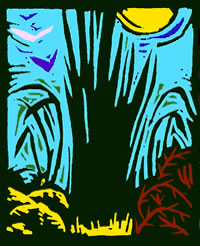
15th Sunday in Ordinary Time Year A
As we have already indicated, Matthew’s gospel alternates narrative passages with passages presenting the teaching of Jesus. Last week’s reading was from a narrative sequence describing the difficulties Jesus encountered in his Galilean ministry. Today’s reading is from the section that follows,; it contains seven parables of ‘the Kingdom’ – a central theme of this gospel. It begins dramatically with the parable of the sower. People have come to hear Jesus crowd the shore of the lake, and he speaks to them from a boat. His parable – to an audience of rural Galileans – is about farming. But this farming is very different from the farming we are familiar with. The single spike ploughs used were not very effective; they would hardly make an impression on the hard ground of paths through the field; they left patches of brambles behind them; the Palestinian soil they ploughed was in many places a shallow covering of the underlying rock; much of the seed, broadcast by hand, would therefore come to nothing, while some that fell in soil made ready by the ploughing would produce the miracle of a fresh harvest. Parables are common in the Scriptures, and their appeal to the imagination, to convey a challenging message, was often used by the Jewish rabbis. The parables of Jesus were distinctive, however. He had already announced the essential message of his preaching in clear words – ‘Make yourselves ready, the reign of God you have looked forward to is upon you!’ His parables describing the coming of this reign were intended to puzzle his hearers – ‘Listen anyone who has ears’. He wanted them to discover a meaning that brought home to them how different the Kingdom he proclaimed was from popular expectations - expectations that looked forward to a political vindication of the nation. (The reply Jesus gave, when asked why he taught through parables, does not mean – as we might expect – that he wanted to withhold the truth from his hearers.; it means that he recognised – as the prophet Isaiah recognised before him, in the text he quoted – that many of his hearers would not have the dispositions necessary to find the meaning he wishes to convey.)
If we disregard the detailed explanation of the parable at the end of today’s reading – probably an addition made by preachers in the early Church tradition, as they adapted this parable of Jesus to a very different audience – the meaning of Jesus’ parable on the shore of the lake is not difficult to grasp. His preaching – and that of the evangelisers who will carry on his mission - will encounter difficulties of many kinds (like the seed of the sower). He has already encountered reversals in Galilee; and as he looked at the crowds curious to hear him he must have realised that his teaching would have little effect on many of them. Nevertheless, the meaning to be found in his parable is forthright: the harvest is certain, and it will be abundant; and there is a note of urgency: God’s time has come; there is no second chance – there is only one sowing for each harvest.
Early Christian preachers, as we have said, developed an explanation of the parable for an audience in a very different situation from the crowd on the shore of the lake. That this addition is included in the gospel has an important lesson for later times. The message of Jesus must be applied to the changing circumstances of the Church’s life. If the original parable urged the disciples of Jesus to sow the word with confidence, now those who have heard the word must show its fruits in their lives. In today’s Church, the biblical revival opens the way for us.
John Thornhill sm

